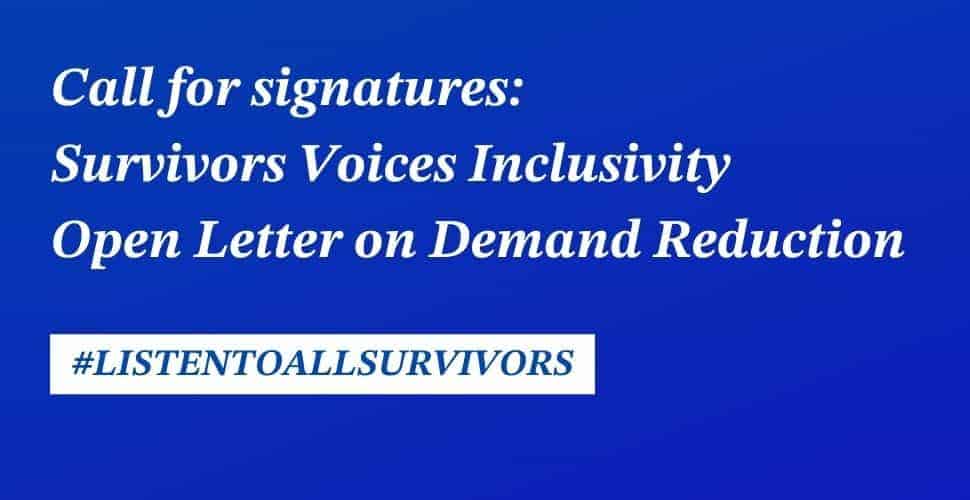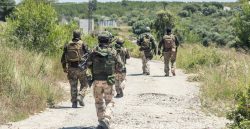Introduction
With permission from the survivor-led, grassroots organizers of this open letter, Freedom United is sharing the text of the letter below. Freedom United has signed this letter and we encourage our global community to sign in support.
SIGN THE LETTER
VIEW UPDATED SIGNATURES
Note: The signature collection form is managed by the survivor-led, grassroots organizers of the open letter who will ensure your privacy is protected. Freedom United will not see any responses.
The following letter was collectively drafted by a survivor-led, grassroots group of over 20 people who included trans, queer, two-spirit, Black, immigrant, and Indigenous survivors, sex worker safety advocates, and allies. Permission is granted to share this unaltered letter on your website as long as you include the link to the original sign-on form as well as the link where the updated pdf will be available each Monday. Permission is granted to download and repost/reshare the pdf linked at the bottom of this page, unaltered. Names will be updated each weekend through the remainder of 2021 and a new pdf provided in this link for your use.
*The Senior Policy Operating Group (SPOG) Ad Hoc Working Group on Demand Reduction was established in May 2020 by the U.S. State Department to examine the role of demand reduction in preventing human trafficking. The SPOG makes up part of the President’s Interagency Task Force to Monitor and Combat Trafficking in Persons. More information here.
October 18, 2021
To the SPOG Ad Hoc Working Group on Demand Reduction Co-Chairs*, and to others who wish to join with us in ending human trafficking and uplifting survivors:
We are writing to express our gratitude as well as our concerns about the recent series of Demand Reduction Listening Sessions, and to use them as a learning opportunity to address broader challenges in the anti-human trafficking movement.
Who we are
The survivors who developed and signed this letter are people with lived experience of force, fraud, or coercion in the sex trades or other forms of labor, or who began trading sex before we turned 18. Some of us experienced commercial sexual exploitation as children. Some of us identify as “survivors of human trafficking.” We have lived experience in a variety of settings, including stripping, camming, pornography, escorting, and street/motel-based sex trading, and all of us are survivors of human trafficking. Some of us do not think of ourselves that way or do not find that particular label for our experiences useful, but we all have been impacted by and share lived experience that fits the definition of “severe forms of trafficking.”
Some of us support full decriminalization of sex work. Some of us aren’t sure. Some of us support demand reduction. We reflect the diversity of perspectives among survivors of human trafficking. For those of us who don’t fit the standard narratives, we have often been erased or sidelined from the anti-human trafficking movement or have not felt that it would be a safe space for our advocacy. We are not interested in only platforming survivors who also oppose demand reduction or who agree with us on other issues; we want to ensure that all survivors have a seat at the table, and that no survivor is harassed or bullied for not parroting the standard narratives.
Signers of this letter include people who have engaged in commercial sexual activity by trafficking, and who (at other times) may have also engaged in commercial sexual activity by choice or through circumstance, but who recognize that different people have different lived experiences and are committed to the empowerment and visibility of all survivors. As a movement, we don’t get to say we are survivor-centered, survivor-informed, and survivor-led while cherry picking survivors who agree with us to be the face of our work. We want to create a movement that holds space for survivors with all backgrounds. We want an inclusive human trafficking movement that truly considers and listens to all survivor voices, not just the ones who agree with us already.
This isn’t about whether or not we like sex work. Whether or not we like sex work is irrelevant to our desire to foster safety for people engaging in commercial sexual activity across the spectrum of agency (choice, circumstance, or trafficking).
We note that historically there has been one dominant narrative in the anti-trafficking field. This narrative exists because certain voices and experiences have been prioritized and elevated, to the exclusion of all others. Failing to interrogate this bias and partiality has maintained this power imbalance through strict hierarchy and gatekeeping. In excluding these other voices, the field has created a self-perpetuating cycle where the simple existence of differing experiences and opinions is not tolerated, and is often seen as a threat.
During the summer of 2021, the SPOG Ad Hoc Committee organized a federal listening session for the federal employees to hear advocate and survivor support for demand reduction best practices. Because of the history of exclusion of certain voices and the framing of the listening session as “best practices for demand reduction,” several advocates and survivors felt uncomfortable attending, worried that their attendance might misrepresent them as supporting demand reduction or lead to them being attacked in a biased space. The September listening session was supposed to serve as a counterpoint to the June listening session, so that there would be a safer space for survivors, advocates, and professionals who oppose demand reduction to share their perspectives and research.
We were and are grateful to the SPOG Ad Hoc Committee for giving space to those survivors who oppose demand reduction at the September listening session. These individuals have historically been excluded and shut out of the movement, and made to feel as if their voices will only be heard and acknowledged if they conform to someone else’s narrative. This history is why it was so important and meaningful for you to hold the September session. It was an important step and signal that you also value the voices of all survivors and have the ability to hold complexity. Thank you so much for taking the brave and principled step to not silence survivors who do not agree with demand reduction. We need all voices at the table to create meaningful solutions.
The September 23rd listening session (which several of us attended) was designed to create a container for federal leadership to hear new perspectives about the ways that racial and cultural inequities are implicated in demand reduction strategies. This requires an acknowledgment of how criminalization, which typically characterizes demand reduction strategies, disproportionately burdens BIPOC communities and the Black community specifically, with the greatest impacts on Black transgender women.
During the listening session, the issue of racial inequities was consistently weaponized by non-Black opponents in the comments to justify support for criminalization, and the assertion that BIPOC communities, and the Black community specifically, would be disproportionately harmed by continued and/or expanded criminalization was consistently ignored and disregarded.
This disregard for the anti-Blackness inherent to criminalization of the sex trades was also evident in the language used in the comments of the session and repeated in the sign-on letter affiliated with World Without Exploitation. Specifically, the word “pimp” is anti-Black. The association is with a Black man (a quick Google image search reveals photographs of Black men and their likeness in caricatured costumes) and derives directly from the racist hyper-sexualization of Black people and specifically the racist notion that Black men have bestial sexual practices and an impulsive, lascivious, uncontrollable sexual appetite (that directly threatens white people). That idea has been used to justify brutality and exclusion against Black people since at least the Reconstruction period. Not only is the term deeply offensive but also shows strong anti-Black bias and a significant lack of cultural/racial competence, and the erasure of Blackness alongside the cultural appropriation of Black epistemologies perpetuates historical trauma.
During the September listening session a number of survivor leaders and anti-pornography, anti-prostitution activists affiliated with World Without Exploitation (WWE) and Coalition Against Trafficking of Women (CATW) who support criminalization efforts attended the meeting and disrupted it during the open comment periods, repeating a pattern of behavior that has happened in other anti-trafficking spaces where diverse perspectives were welcomed. While this second session was framed to the other presenters as offering alternatives to demand reduction, the co-chairs extended an invitation to a survivor who supported demand reduction to be the final presenter in the September listening session. This presenter took statements from previous presenters out of context, thus misrepresenting their words. This person’s presentation, while it raised some important points, would have been better placed in the June listening session.
Attendees attacked all other presenters by using gaslighting and ad hominem attacks in the open chat and during the open comments portion, erasing the existence and experiences of presenters of color and behaving in a manner that precluded open dialogue. It is clear to many of us who have seen these patterns of behaviors repeatedly that this was a strategic attempt to disrupt the session and prevent the Federal attendees from engaging with diverse perspectives, and to silence and intimidate those willing to openly support safety for people who trade sex. In the past, attempts to share these perspectives have been met with abusive behavior from certain people in the movement.
We find using presentation time to personally attack presenters who do not publicly share lived experience to be detestable and counter to productive dialogue to end trafficking. We were particularly disturbed to discover that the in-session attack on Suamhirs Piraino-Guzman, a disabled sex trafficking survivor and immigrant, had been continued in the following days with survivors who had attended the listening session attacking his credibility in other meetings and correspondences, including the accusation that he is lying about his lived experience.
This is unacceptable and violent, and yet it is reflective of a broader and common practice used to silence survivors who do not tell the “right” stories within the human trafficking movement. Many of us have been called “the pimp lobby” (a derogatory and dismissive insult that relies on racist stereotypes as noted above), told we are not real survivors, told we do not understand our own experiences, or are accused of “protecting the rights of pimps and traffickers.” This is false. Traffickers should be held accountable and we are not suggesting otherwise.
The behavior of attacking people who disagree is unacceptable, unprofessional, violent, and causes additional trauma to survivors, and it is the responsibility of the SPOG to establish ground rules that minimize the likelihood of trafficking survivors experiencing preventable harm in a forum the federal organizers were in charge of hosting.
Numerous pro-criminalization individuals on the call have long histories of intimidation and harassment of people who identify as survivors of trafficking and people who identify as sex workers in both virtual and physical spaces, and were invited to this session in spite of their histories of abusive behavior. This session became a continuation of that harassment. The harassment you observed is the reason that many survivors who support sex worker safety are afraid or unwilling to be present in anti-human trafficking spaces.
OUR ASKS
We ask you to join us, in courage and with integrity, to create a movement in which all survivors know their voice will be heard in the movement that claims to support them.
Continue making space for a variety of expert voices in the anti-trafficking movement, including survivors with experiences that differ from or challenge the dominant narrative that has been perpetuated through gatekeeping and survivor sampling bias.
- Develop strategies for constructive dialogue to ensure that the spaces you facilitate do not replicate the same harm and violence they experience throughout the movement through bullying and attacks.
- If you intend to offer additional listening sessions or draft a report offering guidance on demand reduction, offer a series of small group listening sessions first that are invite-only and limited to survivors who hold views that run counter to the dominant narrative, or who have experienced violence, bullying, and marginalization within the anti-trafficking movement itself. Those people do not feel safe in general anti-human trafficking spaces. After the abuse survivors and presenters experienced at the prior listening session, doing this is essential before moving forward to increase demand reduction activities or hosting any additional open listening sessions. Survivors who believe that “ending demand” through tactics of shaming, increased policing, and criminalization of consensual adult sexual behavior have had access to these kinds of opportunities for years; it is the ethical obligation of the SPOG to afford similar opportunities, and in a safe forum, to other survivors as well if you are creating policy recommendations out of demand reduction listening sessions.
- When holding space for survivor feedback, implement trauma-informed, nonviolent communication practices that build cultures of care. Consider practices that emphasize decentralization, involve shared facilitation, and ask for active listening that promotes informed discussions over debate. Safer spaces are created when people acknowledge their privilege and positionality, when resources are shared, when content and strategies are healing and growth-centered, and when we all have the shared responsibility of keeping the space as harm-free as possible through community accountability.
- Many sex worker rights organizations are led by individuals who have lived experiences that fit the federal definition of severe forms of trafficking and are thus their survivor voices are just as valid as those who identify as human trafficking survivors. Work with sex-worker competent anti-trafficking advocates to build partnerships, referral programs, and harm reduction networks to prioritize prevention, response, and services for survivors of ALL forms of violence against people who trade sex. These dialogues have not been universally welcomed, but we believe that engaging in these dialogues will give us an opportunity to look in our collective mirror as a movement, seeing our policies, practices, and messages in a fuller context.
Hold organizations and survivor leaders accountable for their actions that cause harm, including gatekeeping, bullying, and disregard for research.
- Vet organizations and individuals (with or without lived experience) you contract with to ensure inclusion of diverse experiences and ethical practices.
- Advocate for the repeal and removal of contractual stipulations which require an anti-prostitution stance to be held by survivor-advocates. Coercive stipulations replicate the patterns of traffickers by telling survivors what to do or say in exchange for something of value.
- Hold organizations accountable for the ways they weaponize survivors against each other, thus promoting gatekeeping behaviors within the survivor community.
- Do not partner with organizations or individuals who exploit survivor stories to cause harm to or dismiss other survivors. Lived experiences are varied, and the experiences of one survivor should not be weaponized to negate or minimize the experiences of another.
- Recognize that anti-trafficking messaging, interventions, and policies can create harm by perpetuating systemic issues that lead to increased vulnerability and trafficking, and sometimes increase criminalization of survivors. Acknowledge and honor the ethical obligation to consider ways to reduce or mitigate any harms caused by our strategies before and while implementing them.
Our vision is to cultivate a space where we can come together with shared purpose, to co-create and explore themes that reflect our collective experiences and the best available research. Our aim is to uplift one another’s wisdom, talents, voices, life experiences, and contributions.
We seek and demand true, honest, and meaningful reflection, action, and change, both for the survivor community and for the greater anti-trafficking movement. We must understand our anti-human trafficking work within the broader collective social justice and anti-oppression narrative, and within the tradition of anti-violence advocacy which must value and incorporate the feedback and safety of all survivors. We must evaluate current initiatives and implement strategic designs that cultivate affinity between impacted communities. And we must engage in this work with the belief that all survivor voices are essential to a full understanding of trafficking dynamics and possible solutions, especially those survivors who have been historically erased or silenced.
We ask you to partner with us in denouncing bullying within our communities, by our organizations, advocates, and survivors, so that we can show up in solidarity for an effective anti-trafficking movement that does not replicate or amplify harm, and that lives its values of freedom and autonomy. We no longer wish to stand on one another’s shoulders to elevate ourselves; we want a world where we all cross the finish line together.








-
Follow us on Facebook
5.6M
-
Follow us on Twitter
32K
-
Follow us on Instagram
8K
-
Subscribe to our Youtube
5.7K
Donate